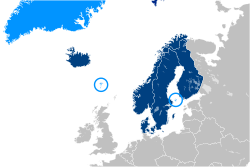
The Benelux Union or Benelux is a politico-economic union and formal international intergovernmental cooperation of three neighbouring states in western Europe: Belgium, the Netherlands, and Luxembourg. The name is a portmanteau formed from joining the first few letters of each country's name and was first used to name the customs agreement that initiated the union. It is now used more generally to refer to the geographic, economic, and cultural grouping of the three countries.

The Council of Europe is an international organisation established in the wake of World War II to uphold human rights, democracy and the rule of law in Europe. Founded in 1949, as of 2023 it brings together 46 member states, with a population of approximately 675 million; it operates with an annual budget of approximately 500 million euros.

The foreign relations of Finland are the responsibility of the president of Finland, who leads foreign policy in cooperation with the government. Implicitly the government is responsible for internal policy and decision making in the European Union. Within the government, preparative discussions are conducted in the government committee of foreign and security policy, which includes the Prime Minister and at least the Minister of Foreign Affairs and the Minister of Defence, and at most four other ministers as necessary. The committee meets with the President as necessary. Laws concerning foreign relations are discussed in the parliamentary committee of foreign relations. The Ministry of Foreign Affairs implements the foreign policy.

Lithuania is a Northern country on the south-eastern shore of the Baltic Sea, a member of the United Nations Organisation, the Organisation for Security and Cooperation in Europe, the European Union, the North Atlantic Treaty Organisation, the World Trade Organisation. Currently, Lithuania maintains diplomatic relations with 186 states Lithuania became a member of the United Nations on 18 September 1991, and is a signatory to a number of its organizations and other international agreements. It is also a member of the Organization for Security and Cooperation in Europe, NATO and its adjunct North Atlantic Coordinating Council, the Council of Europe, and the European Union. Lithuania gained membership in the World Trade Organization on 31 May 2001.
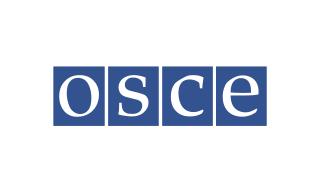
The Organization for Security and Co-operation in Europe (OSCE) is a regional security-oriented intergovernmental organization comprising member states in Europe, North America, and Asia. Its mandate includes issues such as arms control, the promotion of human rights, freedom of the press, and free and fair elections. It employs around 3,460 people, mostly in its field operations but also in its secretariat in Vienna, Austria, and its institutions. It has observer status at the United Nations.

The Nordic Council is the official body for formal inter-parliamentary Nordic cooperation among the Nordic countries. Formed in 1952, it has 87 representatives from Denmark, Finland, Iceland, Norway, and Sweden as well as from the autonomous areas of the Faroe Islands, Greenland, and Åland. The representatives are members of parliament in their respective countries or areas and are elected by those parliaments. The Council holds ordinary sessions each year in October/November and usually one extra session per year with a specific theme. The council's official languages are Danish, Finnish, Icelandic, Norwegian, and Swedish, though it uses only the mutually intelligible Scandinavian languages—Danish, Norwegian, and Swedish—as its working languages. These three comprise the first language of around 80% of the region's population and are learned as a second or foreign language by the remaining 20%.
The Nordic Council Literature Prize is awarded for a work of literature written in one of the languages of the Nordic countries, that meets "high literary and artistic standards". Established in 1962, the prize is awarded every year, and is worth 350,000 Danish kroner (2008). Eligible works are typically novels, plays, collections of poetry, short stories or essays, or other works that were published for the first time during the last four years, or in the case of works written in Danish, Norwegian, or Swedish, within the last two years. The prize is one of the most prestigious awards that Nordic authors can win.

The Baltic Assembly (BA) is a regional organisation that promotes intergovernmental cooperation between Estonia, Latvia, and Lithuania. It attempts to find a common position in relation to many international issues, including economic, political and cultural issues. The decisions of the assembly are advisory.
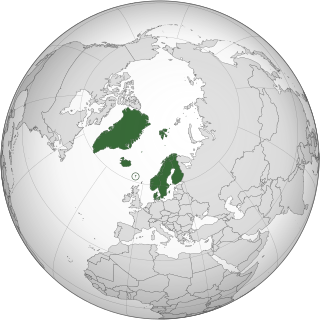
The Nordic countries are a geographical and cultural region in Northern Europe and the North Atlantic. It includes the sovereign states of Denmark, Finland, Iceland, Norway and Sweden; the autonomous territories of the Faroe Islands and Greenland; and the autonomous region of Åland.

Arctic cooperation and politics are partially coordinated via the Arctic Council, composed of the eight Arctic nations: the United States, Canada, Iceland, Norway, Sweden, Finland, Russia, and Denmark with Greenland and the Faroe Islands. The dominant governmental power in Arctic policy resides within the executive offices, legislative bodies, and implementing agencies of the eight Arctic nations, and to a lesser extent other nations, such as United Kingdom, Germany, European Union and China. NGOs and academia play a large part in Arctic policy. Also important are intergovernmental bodies such as the United Nations and NATO.
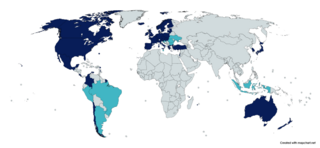
The Organisation for Economic Co-operation and Development is an intergovernmental organisation with 38 member countries, founded in 1961 to stimulate economic progress and world trade. It is a forum whose member countries describe themselves as committed to democracy and the market economy, providing a platform to compare policy experiences, seek answers to common problems, identify good practices, and coordinate domestic and international policies of its members.

Nordic-Baltic Eight (NB8) is a regional co-operation format that includes Denmark, Estonia, Finland, Iceland, Latvia, Lithuania, Norway, and Sweden. Under NB8, regular meetings are held of the Baltic and Nordic countries' Prime Ministers, Speakers of Parliaments, Foreign Ministers, branch ministers, Secretaries of State and political directors of Foreign Ministries, as well as expert consultations where regional issues and current international topics are reviewed.

The Baltic Sea Parliamentary Conference (BSPC) was established in 1991 as a forum for political dialogue between parliamentarians from the Baltic Sea Region. BSPC aims at raising awareness and opinion on issues of current political interest and relevance for the Baltic Sea Region. It promotes and drives various initiatives and efforts to support a sustainable environmental, social and economic development of the Baltic Sea Region. It strives at enhancing the visibility of the Baltic Sea Region and its issues in a wider European context.
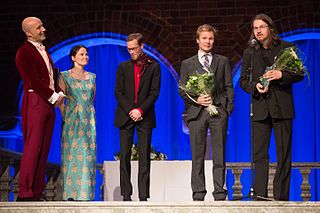
The Nordic Council Children and Young People's Literature Prize is awarded for a work of children's or young adult literature written in one of the languages of the Nordic countries. It was established by the Nordic Council in 2012 after an initiative by ministers of culture in the Nordic countries. The prize was first awarded on 30 October 2013.

This article outlines the history of the Common Security and Defence Policy (CSDP) of the European Union (EU), a part of the Common Foreign and Security Policy (CFSP).

The Barents Euro-Arctic Council (BEAC) is the official body for inter-governmental co-operation in the Barents Region. It seeks solutions wherever and whenever the countries can achieve more together than by working on their own. Cooperation in the Barents Euro-Arctic Region was launched in 1993 on two levels: intergovernmental Barents Euro-Arctic Council (BEAC) and interregional Barents Regional Council (BRC). The overall objective of Barents cooperation has been sustainable development.

The Helsinki Treaty on cooperation between Denmark, Finland, Iceland, Norway and Sweden set the framework for Nordic cooperation in the Nordic Council and the Nordic Council of Ministers. The Treaty was signed on 23 March 1962 and entered into force on 1 July 1962. It was amended in 1971, 1974, 1983, 1985, 1991, and 1995. The most recent amendments entered into force on 2 January 1996.

Armenia–OSCE relations began when Armenia joined the OSCE's predecessor, the Conference on Security and Cooperation in Europe (CSCE), on 30 January 1992. The CSCE transformed into the Organization for Security and Co-operation in Europe (OSCE) shortly afterwards in 1995.
